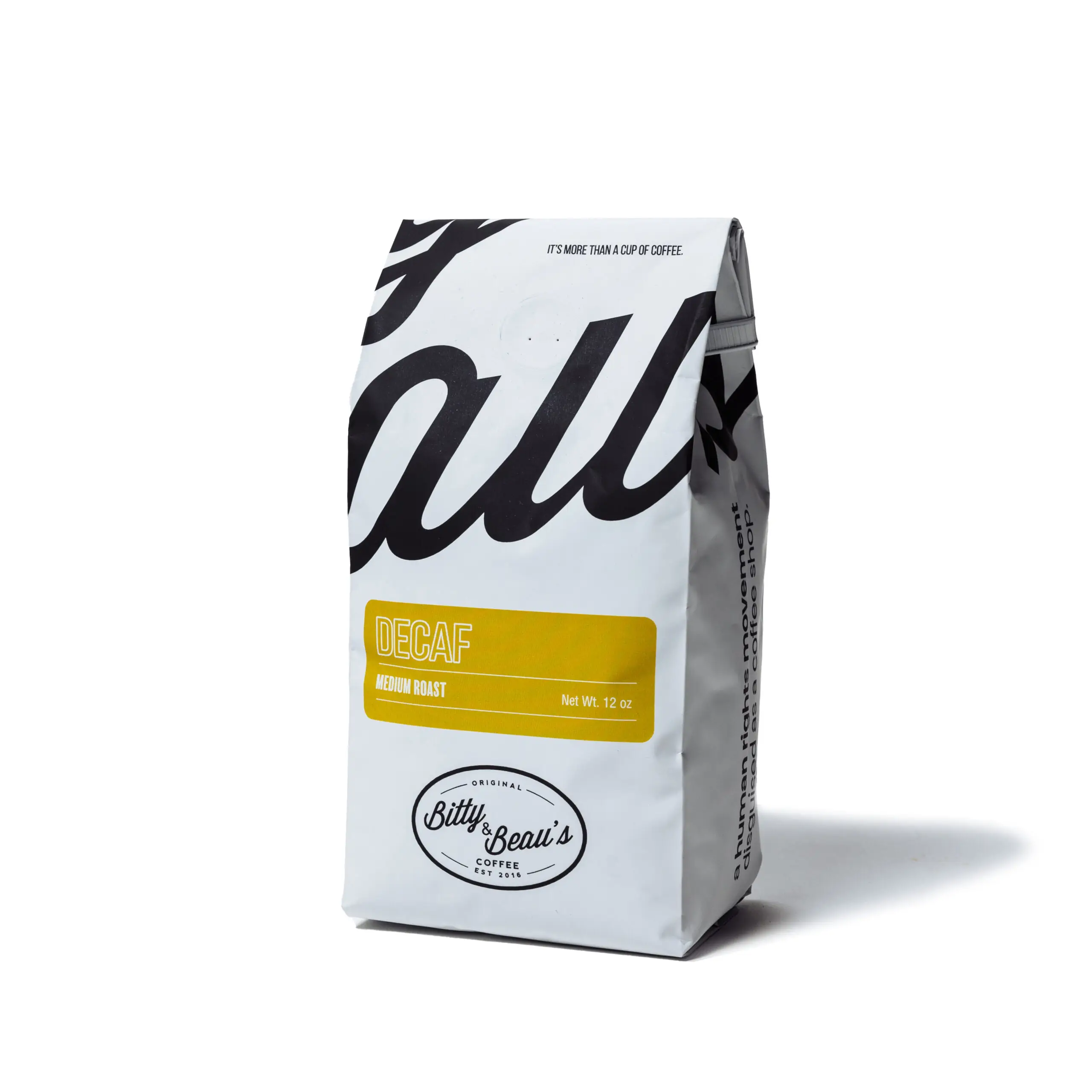
By: Lillie Wright
While most people enjoy coffee for its energy-boosting buzz, providing them with the kick they need to get through the day, others either can’t or prefer not to consume caffeine, whether for religious or health-related reasons. Decaf gets a bad rap in the coffee world, frequently becoming the butt of a joke or “punishment” for unruly customers. Despite the unfavorable press, there are numerous benefits to cutting caffeine from your coffee. We’ll dive deeply and discover why some people are forgoing the jitters.
Caffeine, while widely consumed around the world, is a drug. It’s a stimulant–designed to increase brain activity, heart rate, and energy levels. It is harmless in small amounts, giving exhausted parents, guardians, healthcare workers, and students the push they need to get through the day. But how much is too much? According to the FDA, the average adult should ingest no more than 400 milligrams daily, equating to four or five cups of coffee. Every person’s body responds differently to caffeine, depending on personal habits, body size, and medications. Some people become so reliant on caffeine to get through their days that they ingest much more than the suggested limit and become addicted. Incorporating decaffeinated coffee into your diet helps minimize this dependency and loosen the reigns of addiction. If quitting caffeine cold turkey sends shivers down your spine, gradually replace your coffee. Make a cup with one-quarter decaf and three-quarters regular, then one-third, one-half, all the way down to completely decaf. This slow taper gives your body time to adjust and recalibrate to its new normal. Decaf coffee also reduces side effects like jitters, anxiety, and insomnia.
Decaf coffee also caters to people who cannot otherwise partake in the coffee-drinking experience. People with certain heart conditions should not have caffeine as it makes their heart rate increase too much, and pregnant women should only have about 200 milligrams, according to the American College of Obstetricians and Gynecologists. Increased heart rate and jitters are also heavily associated with anxiety and panic attacks, making those who suffer from these debilitating conditions less likely to opt for full strength. Medications to treat anxiety disorders also tend to magnify the effects of caffeine, making a small twelve-ounce latte feel more like a strong Cold Brew. This disparity between how much caffeine someone drinks and how it makes them feel is enough for some people to swear it off completely. Another potential complication surrounding caffeine and anxiety is serotonin syndrome. When consumed in excess, along with particular anti-anxiety medications, caffeine causes the brain to secrete too much serotonin, causing nausea, irritability, and insomnia, among other things. It takes quite a lot of caffeine to reach this point, but decaf coffee is the perfect way to fill the coffee-shaped void in one’s soul while protecting one’s body and mind.
Speaking of insomnia, caffeine is heavily linked to sleep-pattern disruption. Drinking caffeine too late in the day tells the brain to stay awake and active instead of preparing for sleep. The result? Late nights spent tossing and turning, restless and fitful sleep rather than the deep, restorative rest the body needs. Most regular coffees have anywhere from 80 to 100 milligrams of caffeine, whereas decaf coffee only has 2 to 5 milligrams. This drastic difference allows the minimal caffeine to slip by undetected rather than stimulating the brain for hours on end. If you want something warm before bed and tea isn’t your vibe, reach for a mug of decaf coffee–it’s like a warm hug for your soul. There are also digestive benefits to decaf coffee. Some people find caffeine irritates their stomach, worsening conditions like acid reflux or gastritis. Regular-strength coffee is also highly acidic, making it harder to digest. Decaf coffee is much less acidic, and people with these conditions often find it much kinder on their stomachs. Easier digestion means easier absorption of the excellent antioxidants and nutrients coffee provides. Decaf coffee has slightly fewer nutrients but is comparable to regular-strength coffee.
Some people avoid decaf coffee because they believe it only comes in select brews or flavors. While this may be true for smaller retailers, many large-scale roasteries are hopping on the decaf bandwagon, offering more inclusive roasts and flavors. Starbucks offers both loose grounds and single-serve pods of their brews, from Pike’s Place to Veranda. They understand people want to enjoy their coffee all day long but cannot stomach that much caffeine. Creating decaf versions of their most popular brews keeps guests returning long after their caffeine cut-off. They even have a decaf espresso roast for late-night lattes and cappuccinos.
For those working toward weight management goals, decaf coffee provides the perfect low-calorie treat. The lack of caffeine helps control cravings and appetite, making adhering to a calorie-controlled regimen easier. It also helps maintain blood sugar levels. Drinking black decaf coffee (without excessive sugar or creamers) has shown positive trends in stabilizing blood sugar levels. People with diabetes, or those at risk of developing it, may find solace in a mug of decaf coffee.
Coffee is a social beverage, best enjoyed around loved ones and friends. Making someone coffee shows them you care and want them to feel comfortable. Coffee is disarming, often acting as an olive branch between friends or lovers. It’s warm, earthy, and settling, slowly warming from the inside out. Coffee moments happen every day, no matter the time, so it’s essential to have options that work for everyone. Investing in high-quality decaf coffee shows people you care about them and want them there. Your door is always open, and the perfect pot of coffee is a few minutes away. Check out Bitty & Beau’s Coffee’s decaf roast, or add it to your Coffee Club order because everyone deserves the magic of coffee.
